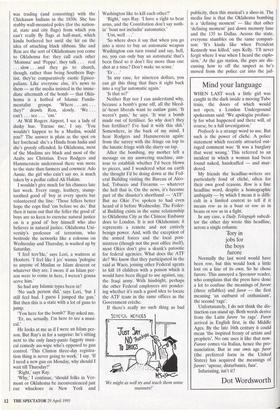Mind your language
WHEN LAST week a little girl was caught in the dark inside a moving Tube train, the doors of which would not open, a London Underground spokesman said: 'We apologise profuse- ly for what happened and there will, of course, be a full investigation.'
Profusely is a strange word to use. But such is the power of cliché. A police statement which recently attracted out- raged comment was: 'It was a burglary that went wrong.' This referred to an incident in which a woman had been found naked, handcuffed — and mur- dered.
My friends the headline-writers are particularly fond of cliché, often for their own good reasons. Row is a fine headline word, despite a homographic ambiguity — by which I mean it is diffi- cult in a limited context to tell if it means row as in a boat or row as in beans or row as in a fight.
In any case, a Daily Telegraph subedi- tor the other day wrote this headline, across a single column:
Tory in jobs for the boys furore
Normally the last word would have been row, but this would look a little lost on a line of its own. So he chose furore. This annoyed a Spectator reader, who complains that the press have done a lot to confuse the meanings of furore (three syllables) and furor — the first meaning 'an outburst of enthusiasm', the second 'rage'.
Unfortunately, I do not think the dis- tinction can stand up. Both words derive from the Latin furere `to rage'. Furor arrived in English first, in the Middle Ages. By the late 16th century it could mean 'the inspired frenzy of artists and prophets'. No one uses it like that now. Furore comes via Italian, hence the pro- nunciation. But in our own age furor (the preferred form in the United States) has acquired the meanings of furore: 'uproar, disturbance, fuss'.
Infuriating, isn't it?
Dot Wordsworth


























































 Previous page
Previous page